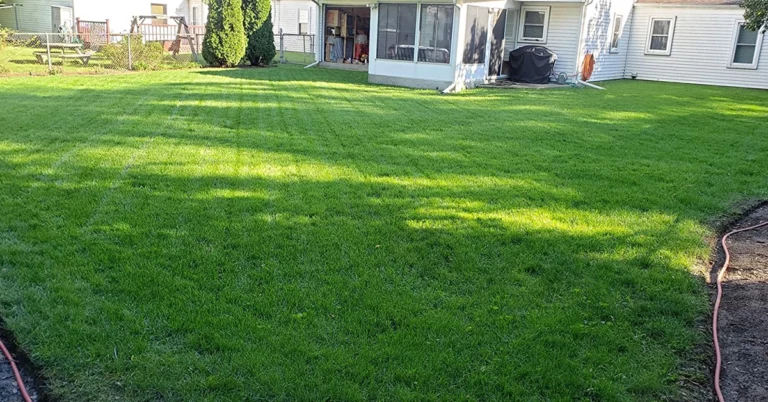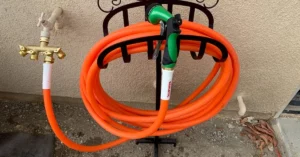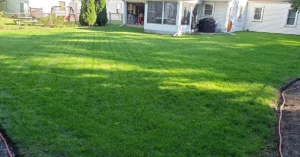
When taking care of your lawn, there are many common tips that will help you keep it looking great. A healthy and well-maintained lawn can make a significant impact on its surroundings. Not only does it look great, but it’s also a constructive way for the environment. When someone takes care of their lawn, it means they’re more likely to keep their yard clean and less likely to use chemicals that may harm our groundwater or drinking water. Here are some common tips to help you take better care of your lawn.
Is It Better To Water Lawn in the Morning or at Night?
The answer depends on what you’re trying to accomplish. Watering in the morning is probably best if you want your lawn to be lush and green. But if your goal is for the lawn to be healthy, then nighttime watering may be better.
Watering lawns in the morning helps prevent evaporation from the soil and helps plants get a jump start on their day. In addition, watering lawns in the evening will allow you to water your entire landscape before dark (i.e., no more trips out after dinner). But if you have a large yard and want to water only certain parts (e.g., the front yard or flower beds), drowning in the evenings may be more convenient for you.
It’s best to water your lawn when it’s warm. The warmer it is, the more moisture there will be in the soil, and the less likely you’ll have to use as much water. However, if you live in an area where summers are hot and dry, watering early in the morning might cause too much moisture in your soil. This could lead to issues with weeds growing too fast and becoming overgrown more quickly than they otherwise would have been able to because they had too much water available.
If this happens, consider using a sprinkler system instead of manually watering your lawn at night so that you don’t waste water doing something that isn’t necessary.
How Many Days a Week Should You Water Your Lawn?
Most homeowners tend to overwater, especially in the warm months. But even if you don’t live in a climate where your lawn doesn’t need irrigation all day, many homeowners still give their lawn too much water every day.
The good news is that there are ways you can control how much moisture your lawn gets without watering it every single day! Here are some tips on how many days per week you should irrigate:
First, find out what type of soil you have and how much water it needs. The rule of thumb is that if you have heavy clay soil, you should rinse daily. If you have sandy or light clay soil (or no soil at all), only irrigate once every two or three days.
Find out how long it takes for the water to seep into the root zone of your plants-this will depend on how porous your soil is and what kind of plant it is (excellent draining plants like blueberries need less frequent watering than grass does).
Should You Water Grass in Hot Weather?
Hot weather means the grass is going to dry out fast. That’s why it’s essential to water your lawn in hot weather. If you don’t, your lawn can become dehydrated and lose its color. When that happens, the grass looks yellowish and unhealthy, which is not what you want to see on your property.
Lawns do best when they have enough moisture for good root growth and healthy green color. This is especially true during the summer when the days are longer than ever. But how much water should you give your grass during hot weather?
There’s no one answer to this question because each yard’s needs vary, from location and climate to soil type and level of sun exposure. There are some general guidelines, though:
- Green grass thrives with an inch of water every week or two during scorching temperatures.
- Grass doesn’t need as much water in cold temperatures (below 50 degrees Fahrenheit), but it still needs some moisture to keep it green during winter when days are shorter.
If you live in a hot climate, you know that the heat can be brutal on your lawn. The hot sun can make grass’s growth difficult and require extra water. While this is true, there are some things that you can do to help your grass stay healthy during the summer months. Here are some tips:
- Watering your lawn during summer is essential to keep the soil moist but not soggy. This will prevent fungal diseases and other turf problems from developing.
- If possible, water your lawn at night when it’s cooler outside, and there aren’t as many insects looking for food or water sources.
- Ensure that all your sprinkler heads are running at full force to ensure that all areas of your yard get enough water throughout the day (and night).
- Don’t water your lawn if it has been raining for more than two hours since it has been wetting the ground too much for roots to grow into.
Conclusion
A beautiful lawn is just the start of a thriving home landscape. You can help your property grow into an attractive, healthy, and drought-free yard by ensuring that you provide the right environment for the plants to thrive. There are many simple things that you can do to maintain your lawn, including applying fertilizer and water.

High Pressure Water Hose Guide
Contents Can You Use a Normal Hose for a Pressure Washer? Does Hose Diameter Affect Pressure? How do I make my garden hose high pressure?

What Is High Pressure Hose Used For?
Contents What is high pressure hose used for? How much PSI do I need to clean my driveway? What PSI is best for washing cars?

Rechargeable Hot Water Bottles Guide
Contents Are rechargeable hot water-bottles safe? How often should you change your hot water-bottle? How long does a rechargeable hot-water bottle last? How do Electric

Will A Heating Pad Ruin A Memory Foam Mattress?
Contents What is a Heat Mattress? Will a Heating Pad Ruin a Memory Foam Mattress? Buy Heating Pad on Amazon Conclusion One of the things

How Do You Clean A Suckle Portable Bottle Warmer?
Contents How does a suckle bottle warmer work? Do I need a bottle warmer if breastfeeding? How do you clean a suckle portable bottle warmer?

3 Tips for Take Care Lawn You Need to Know
Contents Is It Better To Water Lawn in the Morning or at Night? How Many Days a Week Should You Water Your Lawn? Should You

Emily
Head of Content @NotJustType I am a shopaholic and I am here to use my shopping experience and life skill to share to everyone. If you have any question for life, home, garden, you can let me know!
Share this article
Subscribe for weekly updates
